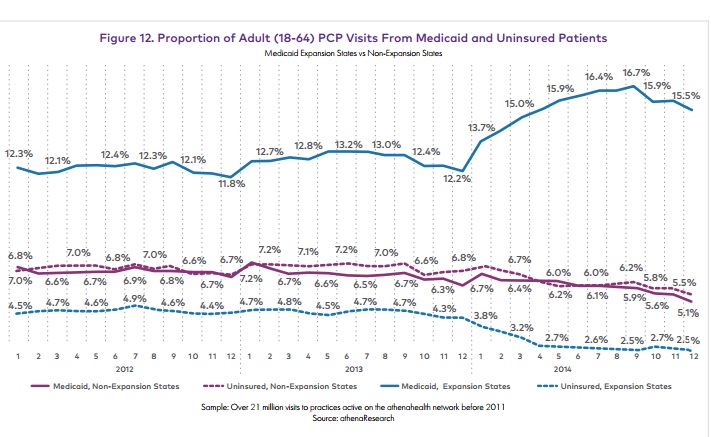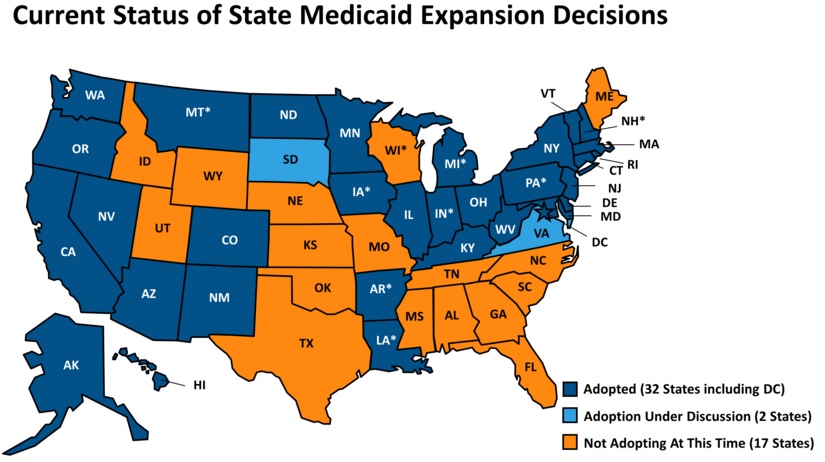Medicaid Expansion Decisions Cost Hospitals, States Billions
Seventeen states have not yet adopted Medicaid expansion. Healthcare costs are becoming hard to manage, states are suffering, and hospital revenue cycle is being hit hard.

- Medicaid expansion rejection is costing various states across the nation a great deal of money. The voluntary decision to not implement Medicaid expansion is potentially harmful for revenue cycle management.

Expansion states have been experiencing sizable increases in their Medicaid populations.
“In many expansion states, roughly 75% of the coverage increase came via Medicaid expansion states,” stated Katherine Hempstead, PhD, Team Director and Senior Program Officer at Robert Wood Johnson Foundation (RWJF).
Many hospitals reported a big difference, including a drop in charity care numbers.
“At the same time, there are some offsetting threats to hospital revenue – such as declining inpatient volume and increasing bad debt from insured patients,” Hempstead said.
Medicaid expansion is challenging for healthcare providers, she explained.
“[Some] of the proposed expansion strategies provide a voucher for eligible people with an employer offer to offset the cost so that providers can continue to get commercial rates for part of the expansion population,” she said. “Medicaid expansion still seems like a definite win for providers overall.”
Hospitals that choose to not participate in Medicaid expansion efforts can potentially lose over $400 billion in federal Medicaid funds, according to an Urban Institute study.
Uninsured beneficiaries have been potentially costing hospitals over $44 billion in healthcare services.

Participating states have more choice when it comes to care delivery and how healthcare providers are paid.
Medicaid enrollment was expected to increase by at least 12 percent across all states last year, reported the Kaiser Family Foundation (Kasier).
According to the organization’s February 2016 research, a total of 17 states have not yet adopted Medicaid expansion.

“A central goal of the Affordable Care Act (ACA) is to significantly reduce the number of uninsured by providing a continuum of affordable coverage options through Medicaid and the Health Insurance Marketplaces,” Kaiser wrote.
“The ACA expands Medicaid coverage for most low-income adults to 138% of the federal poverty level,” Kaiser adds.
A June 2012 Supreme Court decision on the ACA’s Medicaid expansion meant states were left to decide what to do next.
As Kaiser explained within a policy brief released a month after this decision was made:
The most complex part of the Court’s decision concerned the ACA’s Medicaid expansion: a majority of the Court found the ACA’s Medicaid expansion unconstitutionally coercive of states because states did not have adequate notice to voluntarily consent to this change in the Medicaid program, and all of a state’s existing federal Medicaid funds potentially were at risk for non-compliance.
However, a different majority of the Court held that this issue was fully remedied by limiting the Health and Human Services (HHS) Secretary’s enforcement authority, thus leaving the Medicaid expansion (and all other ACA provisions) intact in the law.
Different states are adopting different approaches, some more costly than others.
Kansas’ recent decision to reject Medicaid expansion is apparently costing the state upwards of $1 billion – a loss to taxpayers of $10.75 per second since January of 2014.
New legislation is underway to help close the revenue cycle gap. For instance, the new Bridge to Healthy Kansas initiative aims to promote budget neutrality.
“The Bridge to a Healthy Kansas is designed to create a path to health by focusing on cost-effective preventive care to improve health outcomes and better manage health care costs,” stated this week’s press release from the Kansas Hospital Association (KHA).
More revenue is good news, especially with a $1 billion loss thus far.
“Health care cost savings, combined with new revenue generated by having 150,000 more insured Kansans, would offset program costs to the state of Kansas, making The Bridge to a Healthy Kansas a budget-neutral program that comes at no additional costs to Kansas taxpayers and without requiring the use of State General Funds,” explained KHA.
Early last year, the Tennessee Senate voted to reject Medicaid expansion coverage across the state.
“Medicaid is not a program we should expand; it’s a program we should reform, and with the approval of HIP 2.0 today, Indiana becomes a leading state for reforming Medicaid,” stated Mike Pence, Governor of Indiana.
Pennsylvania decided to transition into a Medicaid expansion plan in February of last year. This Medicaid expansion initiative is 100 percent federally funded until the end of this year.
“Our approach will alleviate confusion, remove unnecessary red tape, and streamline the system so that people can see a doctor when they are sick and healthcare professionals have more time to concentrate on providing quality care,” stated Tom Wolf, Governor of Pennsylvania.
Hospitals, particularly those in Nebraska and Kansas, have apparently been struggling with legal issues over the past year. They are looking for ways to keep revenue high.
Proposed legislation introduced in January of 2015 sought to expand the coverage of family planning services at or below 185 percent of Nebraska’s poverty line. The proposal would potentially save the state at least $28 million.
“States who have obtained family planning waivers have saved millions of dollars in their own Medicaid programs,” said Jeremy Nordquist, Senator of Nebraska.
Last July, Alaska’s governor, Bill Walker, planned to accept both federal and Mental Health Trust Fund Authority money to expand Medicaid to underpriviledged adults.
Walker claimed it all boiled down to a matter of healthcare or bankruptcy.
“Every day that we fail to act, Alaska loses out on $400,000,” Walker said. “With a nearly $3 billion budget deficit, it would be foolish for us to pass up that kind of boost to Alaska’s economy.”
The number of states that will soon make a similar switch is yet to be seen.
Image Credit: [RWJF] (Image 1)
Image Credit:[Kaiser] (Image 2)
